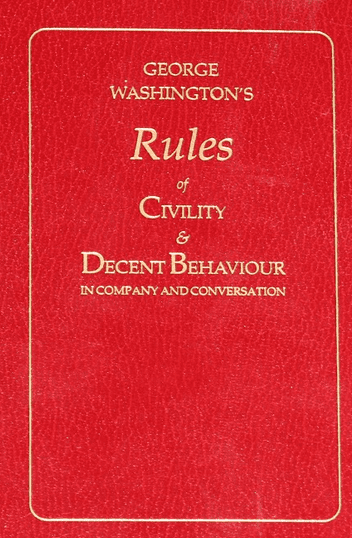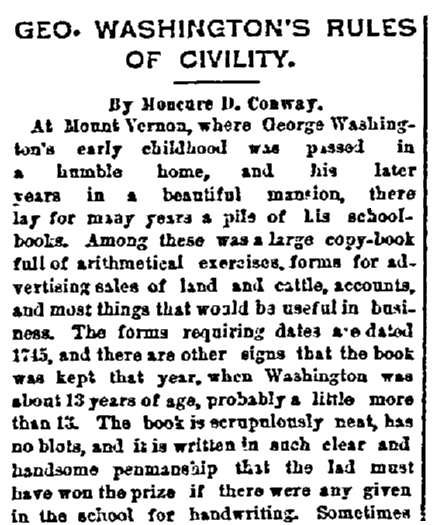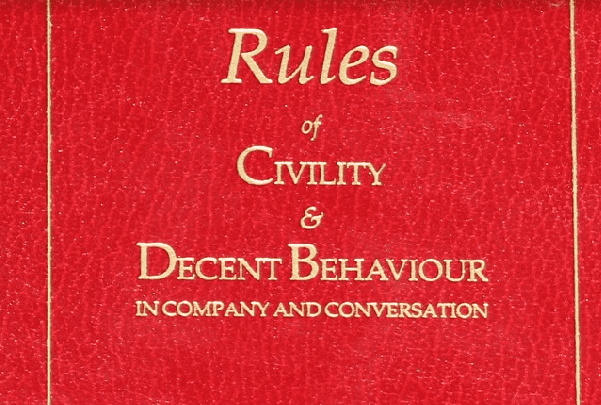Introduction: In this article, Mary Harrell-Sesniak has some fun taking etiquette rules George Washington wrote down when he was a boy – and seeing how they apply to genealogy today. Mary is a genealogist, author and editor with a strong technology background.
Let’s talk etiquette, netiquette and genetiquette (genealogy etiquette)!
Comporting oneself properly is always important. Our ancestors often referred to rules of civility, quoting several publications by that name – including one by the father of our country, George Washington.
Compiled at the young age of 14, Washington’s book drew from earlier times. Years ago I purchased a copy of George Washington’s Rules of Civility & Decent Behaviour in Company and Conversation, and recently decided to see if the rules still apply.

Turns out many still do – and have, ever since Washington wrote his book. For example, this 1891 newspaper article explains how the young Washington carefully wrote down his rules of civility and decent behavior in the blank pages of a math book, and notes that many of those rules were still relevant.

Among the Washington rules quoted in this newspaper article are these two:
- “Do not laugh too loud or too much at any public spectacle, lest you cause yourself to be laughed at.”
- “A man ought not to value himself of his achievements or rare qualities, his riches, titles, virtue or kindred; but he need not speak meanly of himself.”
Other rules of civility also pop up in historical newspaper articles, including this 1817 newspaper article quoting “The Golden Rule.”
This one IMHO is timeless, and probably the most important one of all as it applies to genetiquette. As this topic has never been fully explored, I thought I’d get the ball rolling with some of my own thoughts. Please add your own in the comments section following this article.
1) Be kind. If you have benefited from someone’s research, a web page, publication or even a company’s entire research library, be sure to tell them. Everyone wants to know they are appreciated.
2) Be cautious about correcting. It’s possible there is conflicting evidence you haven’t examined, so undertake your own reasonably exhaustive search. GW’s Rule #83: “When you deliver a matter do it with passion & with discretion, however mean the person be you do it to.”
3) Alternatively, sometimes it’s better not to speak up at all. A professional method is to publish your take on the conflicting genealogy, so that others will be able to make up their own minds.
4) Give credit where credit is due. When evaluating your research, others will ponder if you merely copied something, or examined original sources. Most recommend that you identify the location of obscure findings. Genealogy Tip: To cite a source, consult the author or publisher directly, or refer to a reference such as Elizabeth Shown Mill’s Evidence Explained.
5) Do not plagiarize. Never reprint something as if it were original to you. Copyright literally means “the right to copy” which can only be determined by the author. Genealogy Tip: Copyrighted works are not required to carry a copyright disclaimer. As soon as pen is put to paper, if it is original and more than a phrase, it is copyrighted.
6) Documents in personal collections may not be copyrightable, even if they passed through the family. This is one of the FAQs from the official copyright website http://copyright.gov/help/faq/faq-protect.html that is most applicable to genealogy:
Q: Can I register a diary I found in my grandmother’s attic?
A: You can register copyright in the diary only if you own the rights to the work, for example, by will or by inheritance. Copyright is the right of the author of the work or the author’s heirs or assignees, not of the one who only owns or possesses the physical work itself. See Circular 1, Copyright Basics, section “Who Can Claim Copyright.”
7) Just because something is on the Web, that doesn’t mean it is in the public domain. Be careful if someone claims a photo or document is in the public domain. It’s quite possible they do not have the right to give permission, and you can still be liable for damages if you freely share and upload without permission. GW’s Rule #109: “Let your recreations be manful not sinful.”
8) If you haven’t read the Copyright Law of the United States, don’t claim to be an expert. It has changed over time. The most current version is available at http://copyright.gov/title17/.
9) Study fair use doctrine. Fair usage is complicated, so be sure that you understand when it is appropriate to use. See http://copyright.gov/fair-use/.
10) Respect privacy, especially in regards to DNA results. Just because someone shared their data with you, it doesn’t mean you have permission to forward or share that information with others.
11) Never rant. When something frustrates you, keep it to yourself. After all, who among us has not made a typo or misinterpreted evidence? GW’s Rule #73: “Think before you speak; pronounce not imperfectly nor bring out your words too hastily, but orderly & distinctly.”
12) Do not publish discoveries about living persons. Not only is it wrong, but in some cases you could be violating a law. For example, U.S. HIPAA laws protect the privacy of one’s medical results. See http://www.hhs.gov/hipaa/for-individuals/guidance-materials-for-consumers/index.html. GW’s Rule #60: “Be not immodest in urging your friends to discover a secret.”
13) Never alter an original document. Although it is tempting to bring out the details of an old document, make a copy and add an annotation.
14) If you have enhanced or photoshopped a photograph that can be used as genealogical evidence, make sure it is notated. (Use something like: “Enhanced from the original.”)
15) Be respectful of the time given freely by others. Do not overwhelm with trivialities or expect someone to solve all of your genealogy dead-ends.
16) Do preserve, protect and defend the right of future generations to have access to original materials.
17) Do give back. Share your findings, and if you have benefited from the genealogy research of others, do a favor in return.
18) Lastly, do not force genealogy on the uninterested. Your family may or may not come around to sharing your passion — but if perceived as an unpleasantry, they’ll never enjoy it.
